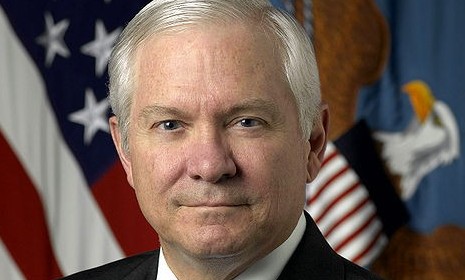Is 'don't ask, don't tell' dead?
The Pentagon has announced plans to weaken the ban on gays in the military. Does this officially mark the demise of the long-standing policy?

A free daily email with the biggest news stories of the day – and the best features from TheWeek.com
You are now subscribed
Your newsletter sign-up was successful
In a step toward ending the military's "don't ask, don't tell" policy against gays in the military, Defense Secretary Robert Gates on Thursday announced new rules making it more difficult to kick gay and lesbian soldiers out of service. Gay rights activists have applauded the move. But Lt. Gen. Benjamin R. Mixon, a three-star general in command of Army forces in the Pacific, wrote a letter to Stars and Stripes arguing that many in the armed forces still believe letting gays serve openly is a mistake, and that Gates is squelching debate. But are objections academic at this is point — is "don't ask, don't tell" already dead? (Watch Robert Gates' comments on the military's treatment of gay soldiers)
Refusing to enforce the policy is almost as good as killing it: Only Congress can officially kill "don't ask, don't tell," says Mark Thompson in Time. But under Gates' new rules, only an admiral or general can approve ousting a gay soldier — a full rank higher than previously. That bureaucratic hurdle alone should cut down on the number of explusions immediately.
"Enforcing 'Don't Ask, Don't Tell': Don't bother"
The Week
Escape your echo chamber. Get the facts behind the news, plus analysis from multiple perspectives.

Sign up for The Week's Free Newsletters
From our morning news briefing to a weekly Good News Newsletter, get the best of The Week delivered directly to your inbox.
From our morning news briefing to a weekly Good News Newsletter, get the best of The Week delivered directly to your inbox.
It is dead — opponents of lifting the ban need to shift their focus: The repeal "is going to happen," says blogger Jsanzone in RedState. "Gays and lesbians will serve openly in the United States military, in a matter of years if not over the next 12 to 24 months." So now those of us who think letting gays serve openly is bad for the military must "be diligent" in making sure the end of "don't ask, don't tell" doesn't damage "military readiness."
"Blogging, don’t ask, don't tell, 'Health care reform'"
Reports of the death of DADT are premature: Under the new rules, "a soldier outed by someone else won't be entirely safe," say the editors of Queerty, "but his accusers will have to testify under oath, and anonymous outings" won't be allowed. That means "malicious outings" are a thing of the past, but any time it's widely known that a soldier is gay it will likely be easy for someone to find enough evidence to satisfy the requirements and get him or her discharged.
"Questions we still have about Sec. Gates' new DADT Dismissal rules"
A free daily email with the biggest news stories of the day – and the best features from TheWeek.com